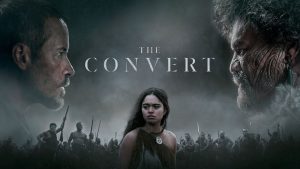THERE haven’t been many films made about the Māori Wars in New Zealand.
Unfortunately, the latest, Lee Tamahori’s The Convert, takes the familiar path of focusing the story on a western character.
Even if Guy Pearce’s lay minister, Thomas Munro, is based on an historical character, I suspect this is crucial to getting the film made at all.
With a name like Pearce in your advertising there is already a built-in audience and interest among the critics.
Munro may not be fully portrayed as a ‘white saviour’, but his character is explored and presented as a sympathetic, mediating influence between the warring clans.
The script for the film was written by Tamahori and Shane Danielsen and based on a novel by Hamish Clayton.
It’s 1830 and Munro is among the people who arrive on a ship severely damaged in a storm. During a clash between two Māori tribes, Munro protects a young woman who turns out to be Rangimai, a daughter of Maianui, the chieftain of one of the tribes.
Munro becomes Rangimai’s tutor and, during the course of the film, reveals how he has come to the other side of the world seeking redemption for something that happened in his past.
Munro tries to help negotiate a truce between the tribes but there are other influencers that would prefer the Maori people never put aside their differences, lest they join forces against their invaders.
Pearce is good as always and Tamahori knows his way around action set-pieces and does a pretty decent job of working with a clearly limited budget.
The main problem with the film, however, is the script which doesn’t delve deeply enough into Maori history and culture and their view of the conflict.
Watched at the cinema.
